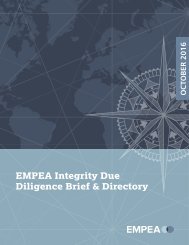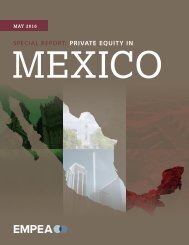You also want an ePaper? Increase the reach of your titles
YUMPU automatically turns print PDFs into web optimized ePapers that Google loves.
Zambia and Zimbabwe, the report noted that while there are signs <strong>of</strong> intent to introduce ESG disclosures from some <strong>of</strong><br />
the stock exchanges, there is room for exchanges to develop more extensive and meaningful disclosure requirements.<br />
The report finds that, with the exception <strong>of</strong> listed companies on the Johannesburg Stock Exchange (JSE), the level <strong>of</strong><br />
sustainability reporting from the largest listed companies across Sub-Saharan Africa is very low, with only 13 companies<br />
(15%) reporting on sustainability, either through a sustainability report, combined report or integrated report.<br />
5. HOW DONORS CAN HELP<br />
A generic strategy for any financial centre might be:<br />
• Get real—more aggressive promotion addressing shortcomings with long-term planning yet avoiding the appearance<br />
<strong>of</strong> capricious regulatory change, combined with a clear legislative cycle in finance where finance bills change regularly<br />
but not too rapidly;<br />
• Get integrated—consider ‘mid-shore’ strategies where there is a symbiotic <strong>of</strong>fshore relationship with larger or<br />
neighbouring nations allowing businesses to function under less-than-ideal or complex onshore regulation;<br />
• Get better—tackle long-term skills shortages with better training for indigenous populations rather than relying on<br />
imported skills; improve power, transportation and communications infrastructure;<br />
• Get connected—host high-pr<strong>of</strong>ile regular events, create strong academic links, simplify visa and work permit<br />
processes; and,<br />
• Get serving—increase levels <strong>of</strong> service both for those entering the centre and long-term residents; use benchmarks,<br />
data comparisons, and awards to keep service high, encourage innovation.<br />
Some suggestions for donors focussed on building financial centre capacity might be programmes containing some <strong>of</strong> the<br />
following ideas:<br />
Get Real – Hard Targets, Hard Measures, Hard Knocks<br />
• Set out a standard for a Memorandum <strong>of</strong> Understanding between a government and its domestic financial<br />
services on such items as inward investment, infrastructure investment, tax changes, or venture capital rules – basically<br />
agreements on how governments will change the rules in consultation with industry. This could be combined with<br />
scorecards or indices (an African Regulatory Effectiveness Index, for example) that underpin targets and evaluation.<br />
African centres need to expose themselves to international scrutiny and competition—this obviously is important for<br />
attracting foreign investment but also for retaining domestic talent with knock-on benefits for domestic capital markets<br />
development. With sufficient take-up, a standard Memorandum could become a pan-African commitment.<br />
• Consider Policy Performance Bonds, perhaps in conjunction with development agencies. Such bonds would pay<br />
investors if policies were not delivered, yet give interest-free money to governments that did deliver. Such bonds<br />
would be investment hedges and reduce political risk. Governments would pay for non-delivery <strong>of</strong> policy outcomes.<br />
The terms <strong>of</strong> the bonds would reflect the pace <strong>of</strong> change and the commitment to longer-term goals.<br />
• For onshore countries, deliver full, early compliance on people and tax, e.g., anti-money laundering rules, FATCA,<br />
know-your-customer. Malta is a good example <strong>of</strong> a country which has attempted to be first to implement new EU<br />
regulations on the basis that delay rarely if ever helps it be competitive, whereas early compliance does. Outside the EU,<br />
identifying ‘real’ regulations versus norms, e.g., OECD, is more difficult, but leading on early compliance can still be a<br />
competitive angle.<br />
• Equally fight for tax simplicity in all African centres. A good starting point for donors might be a comparative evaluation<br />
<strong>of</strong> the complexity (or simplicity) <strong>of</strong> African tax rules. A more radical step might be to promote the simple tax structures<br />
<strong>of</strong> land value taxes or flat consumption taxes that both make economic sense and simplify the tax system. Naturally<br />
there are wider tax issues <strong>of</strong> certainty and corruption, but simplification might be the positive theme.<br />
<strong>Conduits</strong> <strong>of</strong> <strong>Capital</strong> – Onshore Financial Centres and Their Relevance to African Private Equity<br />
| 131





